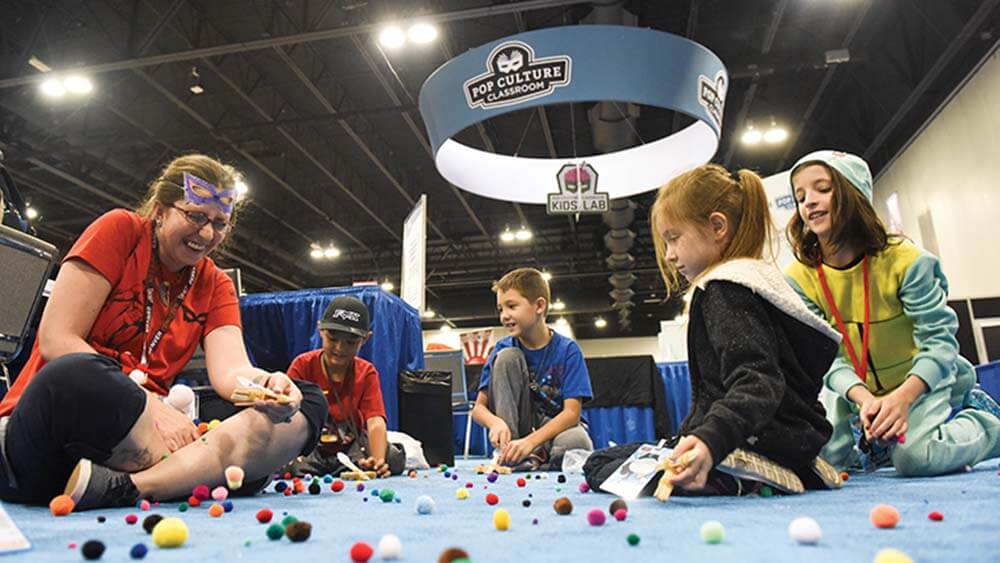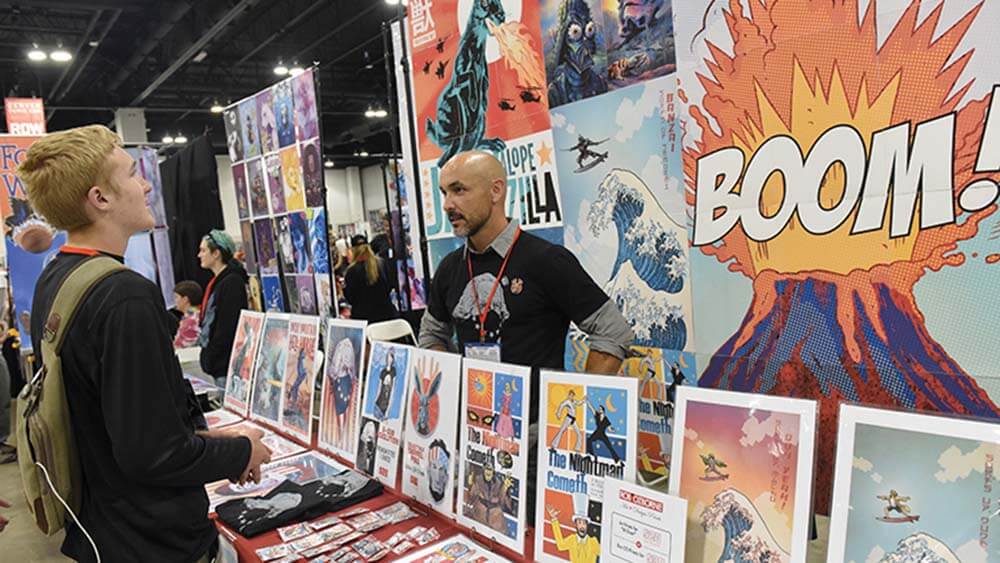
Pop Culture Classroom (PCC), a nonprofit that provides the Denver community with educational resources, came up Denver Comic Con as a way to raise funds for its work. (Chris Schneider Photography)
Sometimes, Wonder Woman and Spider-Man really do save the world — or at least a part of it. Take the Denver metropolis, for instance. While most Comic Con editions focus on giving fans elaborate cosplay opportunities and star-studded panels, Denver Comic Con, held each June, aims for a higher purpose. Organized as the primary fundraiser for Pop Culture Classroom (PCC) — an organization that provides the Denver community with educational resources — the convention offers “all the usual cool comic con offerings,” said Sam Fuqua, executive director of PCC, plus hundreds of hours of unique educational programming.
PCC was started in 2011 by “a group of self-described nerds who came together out of a shared love for comics and pop culture,” said Fuqua, who joined the organization in 2014. “Its founders believed that the tools of pop culture could be used to help improve literacy among school-aged kids and better engage them, so they developed PCC to create those resources for the classroom. One of PCC’S curriculum units, “Storytelling Through Comics,” uses age-appropriate comic books to promote art, reading and problem-solving skills. The 15-lesson unit “walks kids through the vocabulary of comics and how comics work,” he said. “[It] teaches narrative structures, storytelling arcs, simple art lessons, and then has the kids pick a problem they seen in their own lives. Identify a hero and a villain — understand multiple perspectives, and then create their own comic and tell their own story.” This PCC program and others are available for teachers to download themselves, or for them to request contracted PCC instructors to teach their students.
At least half a dozen Denver schools are using PCC’s learning tools at any given time, but as a nonprofit, PCC needs funding to survive — which was how Denver Comic Con was born. “We produce it,” Fuqua said, “and we use it to showcase the educational mission of the nonprofit.”
A Geeky Education
The convention — which has grown to be the Colorado Convention Center’s largest consumer show in the five years it has been running, attracting approximately 115,000 attendees in 2017 — provides a taste of PCC’s mission. “Experience the CoMix” invites 400 low-income middle-school and high-school students to experience the fun of the event and learn through educational programming along the way. Adult attendees can stop by a workshop on how to draw with ink if they’re interested in drawing comics, learn how to create a costume on a budget, or even learn the basics of game design. And educators interested in professional development can take the “Enhancing Education Through Pop Culture” course to earn college credit through the locally based Adams State University, or attend Educator’s Day, an entire track within the program focused on academics. “There are panel discussions on the pedagogy of pop culture,” Fuqua said, “and workshops for teachers who are interested in using pop culture in their classroom to engage students and to improve literacy rates.”

Denver Comic Con offers all the usual fan expo trappings, including a way for comics creators to meet their fans. (Chris Schneider Photography)
Breaking Down Walls
Fundraising through Denver Comic Con has allowed PCC to expand its reach beyond grade-school students and educators. In 2015, the organization launched the LEAD (Literacy, Education in Adult Detention) program to help inmates at local prisons.
“We developed that program after reviewing research that shows that as literacy rates improve for inmates, recidivism goes down,” Fuqua said. “There’s a connection between someone becoming more literate and the likelihood that they’re going to re-offend and end up back in the correction system. So, it seemed like a great opportunity for us to adapt a program that we had developed for the schools to an adult incarcerated population.”

(Chris Schneider Photography)
After experiencing success with “Storytelling Through Comics” with students, PCC redeveloped it for adults by changing the reading material, with positive results. “The ideas are the same, you know?,” Fuqua said. “You get people reading, you give them an understanding of how comics work, and then you give them an opportunity to tell their own story.”
Fuqua thinks that providing inmates with a creative outlet has made all the difference in changing their perspective on life after incarceration. All three of the local prisons PCC works with have said that the program has increased an interest in reading among the inmates who participate. What PCC also learned — and didn’t anticipate — was that the prison staff who teach the curriculum on location have also seen that the program has resulted in more positive behavior among participating individuals.
“There’s a fair amount of adults who have ended up in correctional facilities through some bad choices they’ve made who have never had an opportunity to tell their own story. Who have maybe never been told that they have creativity inside of them,” Fuqua said. “Our programs are a chance for everyone to tap into the creative power that we believe is inside each and every human being.”
Show-Floor Model
In addition to Denver Comic Con’s many learning opportunities for adults, the show has another element that sets it apart as being organized by an educational nonprofit, Pop Culture Classroom (PCC). The main show floor features a 10,000-square-foot area called PCC Kids Lab for younger attendees, dedicated to STEM-themed (science, technology, engineering, and math) activities. The space has “everything from simple activities for the little kiddos to an area within the lab we call the 8-Bit Lounge, which is specifically for teens to interact with creative professionals,” said PCC’s Sam Fuqua. “Most of the large comic cons are commercial ventures. It would be, I think, unusual for another comic con to give [away] 10,000 square feet of their main show floor — which we could obviously be monetizing for thousands of dollars — to an educational program.”
Learn more about Pop Culture Classroom’s offerings at popcultureclassroom.org. To learn more about Denver Comic Con, visit denvercomiccon.com.
